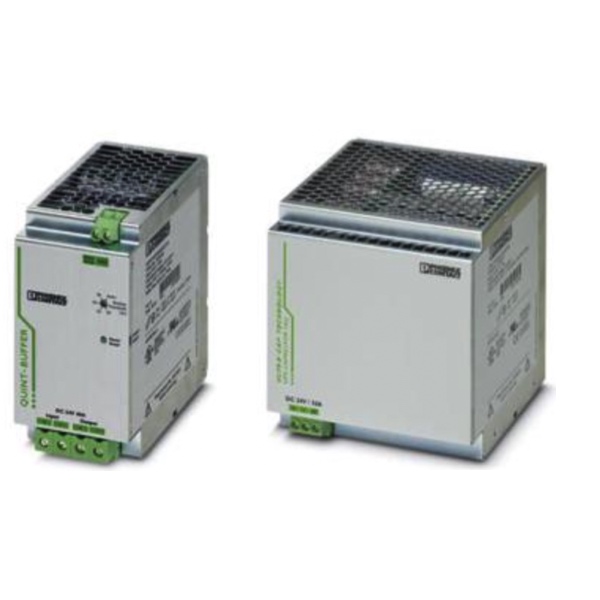
UPS Capacitors

Uninterruptible power supplies (UPSs) are electrical devices that provide near-instantaneous protection from input power source failures by providing backup power. This is critical in industrial settings where a power disruption can lead to costly downtime and damage to expensive equipment. Choosing the proper UPS system can provide the necessary power to cover short-term outages and enable safe system shutdown during extended power outages.
Phoenix Contact provides a modular system of UPSs that feature long service life, zero maintenance, long buffer time and/or performance at extreme ambient temperatures. The comprehensive selection of battery modules include: UPS batteries with lithium iron phosphate technology, UPS batteries with lead Absorbent Glass Mat (AGM) technology, UPS Batteries with pure lead AGM technology and capacitor energy storage devices.
Phoenix Contact capacitor energy storage devices offer maximum service life with no maintenance required. The service life is over 20 years and over 500,000 charging cycles and the buffer load currents are 20 A for 30 seconds or 1 A for 12 minutes. The capacitors are lightweight (0.4 kg) and temperature-resistant between -40 to 60 degrees Celsius.
Products
An Uninterrupted Power Supply (UPS) is an electrical device that provides backup power via a battery to a load when regular utility power has been lost. Depending on the UPS, some can provide protection against voltage spikes or power surges that help protect any equipment that is connected to the UPS. UPSs are not intended to be used for long periods of time. Typically, they are only used for short periods of time to provide critical backup power until an alternative power source can be provided.
UPSs allow any electrical equipment connected to it to continue to run in the event of a power outage. For example, control cabinets in industrial applications can be kept running, making sure that the critical monitoring and controlling functions are not interrupted. UPSs allow enough time to save data on a computer that might be in jeopardy, due to a sudden power outage. UPSs can also act as a bridge while the backup generator is coming online and synchronizing with the electrical system.
Standby or offline UPSs work with equipment that is typically energized by utility power. When the voltage being received by the UPS falls below a certain level, the UPS switches the connected equipment to the inverter connected on the UPS. At this point, the UPS will begin providing backup power from the battery.
Online UPSs works with equipment that is constantly drawing power from the battery through the inverter, so no switching is necessary. In this case, utility power is only being used to keep the battery charged. This allows for much more seamless power usage during an outage.

